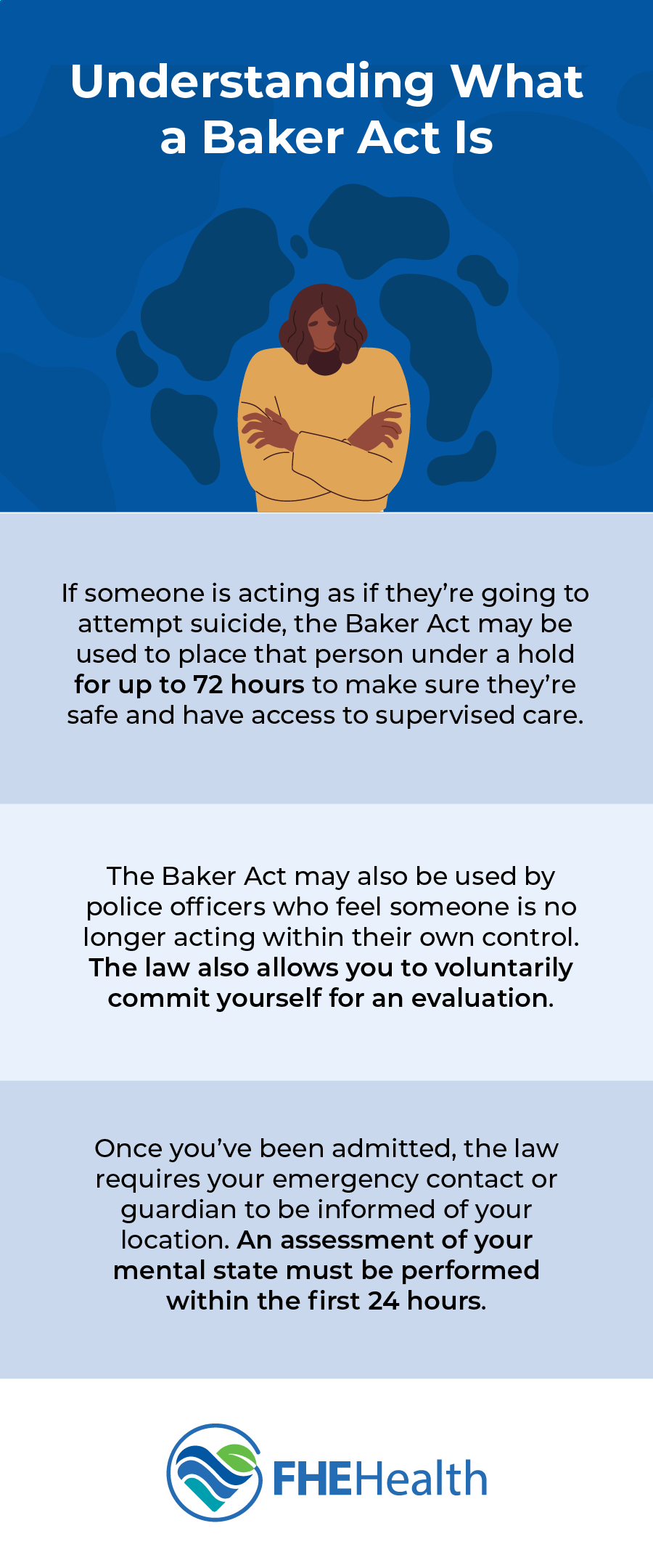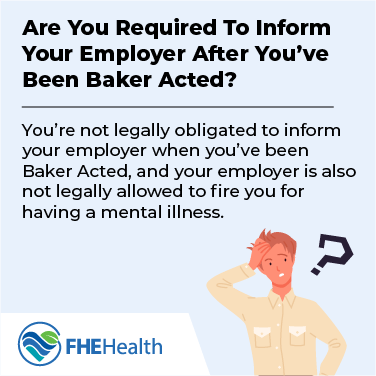
How does the Baker Act affect employment? You may have heard the term “Baker Act” before, but may not understand its meaning. A good example is if you have a mental health condition that causes episodes of psychosis and you find yourself detained against your will for a mental health evaluation.
Having gone through the episode, you may be worried about what happened if you don’t remember the details and how this will impact your relationships with your friends, family, and employer. It’s perfectly reasonable to be concerned about what comes next, and our counselors can provide the guidance you need to recover while retaining your employment. The last thing you need is to endure additional problems because of something that might not have been under your control.
If you’re aware of your legal rights, you can pick up the pieces with minimal negative impact on your career.
Understanding What a Baker Act Is and Who Is Informed of It
 The Baker Act is a law that was passed in Florida in 1972 and named after its sponsor, Maxine Baker. It allows family members to have people temporarily detained if there’s a credible reason to believe they’re a threat to themselves or others. For example, if someone is acting as if they’re going to attempt suicide, the Baker Act may be used to place that person under a hold for up to 72 hours to make sure they’re safe and have access to supervised care.
The Baker Act is a law that was passed in Florida in 1972 and named after its sponsor, Maxine Baker. It allows family members to have people temporarily detained if there’s a credible reason to believe they’re a threat to themselves or others. For example, if someone is acting as if they’re going to attempt suicide, the Baker Act may be used to place that person under a hold for up to 72 hours to make sure they’re safe and have access to supervised care.
The Baker Act may also be used by police officers who feel someone is no longer acting within their own control. If someone is acting recklessly or erratically, a police officer may choose to use the Baker Act to have them evaluated for a mental illness. The law also allows you to voluntarily commit yourself to an evaluation if you feel you might harm yourself or another person.
Once you’ve been admitted, the law requires your emergency contact or guardian to be informed of your location. If you have an attorney, they’ll also be notified. An assessment of your mental state must be performed within the first 24 hours, and you’re not allowed to be held for longer than 72 hours unless you consent to inpatient care beyond that point.
Are You Charged With Something by Default?
You’re only charged with a crime if you’ve done something that warrants criminal charges. If you do happen to be charged with a crime, you’re booked through a police station before being transferred to a psychiatric facility. In some cases, you’re not allowed to be released unless you’re discharged into the care of law enforcement if your reason for the Baker Act was a violent crime.
If the Baker Act was invoked to prevent a crime from being committed and you didn’t yet break any laws, you’re not likely to be charged with a crime. It’s important to speak with an attorney regarding your legal rights, whether you’re facing any charges, and what your best course of action is for your defense.
How Long Does a Baker Act Stay on Your Record?
There’s currently no way to have a Baker Act removed from your record if the police were involved. However, the report may only mention that there was an incident with the police without additional details, especially if the matter never makes it to trial. Baker Acts are also not listed on the FBI’s National Instant Criminal Background Check System.
Are You Required To Inform Your Employer?
 It can be tricky to decide what to do after you’ve been Baker Acted because you may require additional treatment to recover, which may include a recovery program. You’re not legally obligated to inform your employer when you’ve been Baker Acted, and your employer is also not legally allowed to fire you for having a mental illness. What puts you most at risk of losing your job is if you don’t seek the treatment you need before you do something on the job that your employer could fire you for.
It can be tricky to decide what to do after you’ve been Baker Acted because you may require additional treatment to recover, which may include a recovery program. You’re not legally obligated to inform your employer when you’ve been Baker Acted, and your employer is also not legally allowed to fire you for having a mental illness. What puts you most at risk of losing your job is if you don’t seek the treatment you need before you do something on the job that your employer could fire you for.
Should you decide to have yourself admitted for inpatient treatment, several laws allow you to get the leave you need, medical coverage for treatment, and any additional accommodations that may help your reintegration into your job.
Dr. Beau A. Nelson, DBH, LCSW, Chief Clinical Officer at FHE Health and longtime clinician advises, “Because of stigma and sharing sensitive information before you are better, err on the side of disclosing as little as possible. Work with your providers to ensure that your rights are protected. Later on you may choose to share, when you are over the worst of it, but at first focus on getting better.”
The Americans With Disabilities Act
Mental health conditions qualify under the Americans With Disabilities Act as a condition where you can seek reasonable accommodation to be able to perform your job better. In this instance, that accommodation may be time off work to seek the treatment you need. Your employer can’t fire you for disclosing that you have a mental health condition and may be able to give you the accommodations you’re requesting through another important law.
Family and Medical Leave Act
The FMLA allows you to take up to six months off work due to medical needs that prevent you from being able to do your job. If you’ve been Baker Acted, the need for mental health treatment qualifies you for medical leave, and your employer is required to approve your request. Keep in mind, though, that the FMLA doesn’t require your employer to pay you while you’re on leave.
Mental Health Parity and Addictions Equity Act
The MHPAEA requires insurance companies to offer coverage for mental health treatment, so you can’t be denied coverage if you choose to be admitted into a recovery program. Your employer is also not allowed to deny you health insurance coverage as long as you’re on FMLA leave. This means you get to keep your coverage and can use it to pay for your stay at a psychiatric facility.
How To Address the Situation While Retaining Your Employment
If you’ve shared the reason for your absence with your employer, your supervisors are required to keep the matter private. This means you don’t need to share any details with your coworkers about why you were gone or what you’ve gone through. If your employer does share this information and it creates a hostile work environment for you, you have the right to sue your employer for damages.
What your employer is entitled to request is regular drug screenings and a note from your physician that verifies you’re fit to perform your duties. These matters will be kept private, so if you’re worried about what your coworkers may think of your absence, rest assured, you don’t need to go into great detail about why you were away. Their most likely response will be to welcome you back and help you get caught up on what you missed while you were gone.
If you feel overwhelmed by your mental health problems, don’t hesitate to get help. Contact us today to speak with one of our understanding counselors. We can guide you through the next steps to take to ensure a quick recovery while maintaining your employment.






